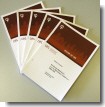| Oficina do CES | ||||
|
|
||||
|
|
327 Data de publicação: Agosto de 2009 |
|||
Abstract: Many oppressed groups use art as a weapon of struggle against repressive regimes. What effects might such art have? This paper focuses on solidarity art, a little-studied subset of resistance art, and suggests that it may help inform members of the public abroad about human rights violations, and raise economic and moral support for cells of resistance. Within the country under a repressive government, the spaces in which such art is made can provide a forum for the dissemination and discussion of information about the extent and nature of government abuses and other ills that accompany the regime. |
||||
